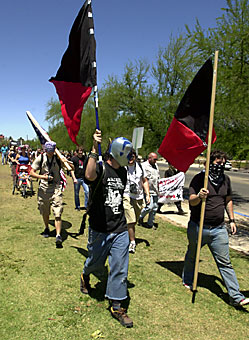 |
|
WILL SEBERGER/Arizona Daily Wildcat
|
About 40 students and Tucsonans gathered at North Fourth Avenue and East Speedway Boulevard on Saturday to march against the war in Iraq. The May Day parade was also held to protest capitalism and labor- related issues.
|
|
|
By Holly Wells
Arizona Daily Wildcat
Monday, May 3, 2004
Print this
About 40 people, including several students, marched down North Fourth Avenue Saturday to try to draw attention to International Worker's Day, also known as May Day, and to protest the war in Iraq.
The march, which set out to show support for the solidarity of workers worldwide and organized by the Tucson Radical Action Network, quickly turned into a forum for marchers to protest the American government and the war in Iraq.
"Feed the people, stop the war" and "George Bush, war criminal" were a few of the statements marchers yelled as they walked down Fourth Avenue.
The date marked the one-year anniversary of President Bush's declaration that major hostilities in Iraq had ended.
Since May 1, 2003, 594 U.S. soldiers have died, according to The Associated Press. As of Friday, a total of 732 U.S. service members had died since the war in Iraq began.
Brian Marks, a geography graduate student, said the purpose of the May Day March was to remind Americans that workers in other countries aren't as lucky as they are.
"The economic freedoms we have are not just gifts from God or the government; they're things working people had to fight and sometimes die for," he said.
But he said the march might have turned into an anti-war rally for some because May Day recognizes the struggle between people with money and people without it.
"A lot of the people here believe war is just a scam to make money," he said, "They have a suspicion of government power and its alliance with big businesses."
Many marchers carried flags with sayings such as, "No war between nations, no peace between classes" and "Will not work for oil."
One protester carried signs with pictures of dead Iraqis and a shopping cart full of bread. He said he carried the pictures of dead Iraqis because the American media doesn't show such images.
"I'm disgusted that the U.S. is continuing to massacre people in Iraq," he said, "It's ironic that Bush said the mission is accomplished while the death toll continues to rise."
The march began at Catalina Park, and the marchers walked down Fourth Avenue. The street was mostly empty, and the marchers had no onlookers until they reached East Sixth Street. On Sixth Street, the T.S.R.A. Rodder's Days, a classic cars show, started. There, the marchers got the biggest response.
Some spectators joined the marchers' chants, while others yelled "Go Home."
Zaliah Zalkind, a liberal arts junior who was wearing a shirt with a picture of George Bush and the words "International Terrorist" on it, said the march wasn't about the war.
"The government has tried to cover up May Day, but we'll always celebrate international solidarity of worker," he said.
Although the marchers didn't get parade permits, police followed them on bikes without trying to stop the march.
Patrick Bigger, a geography junior, said it was appropriate the march fell on the anniversary of the day Bush declared the war in Iraq over. Bigger said war only benefits the ruling class and never benefits workers.
"Americans have no business there and need to get out," he said, "One less American there means one less Iraqi murdered."
The story of May Day began in 1884 when the Federation of Organized Trades and Labor Unions passed a resolution stating that eight hours would constitute a legal workday, to go into effect May 1, 1886, Marks said.
Since legislative methods had failed to enforce an eight-hour workday, the resolution called for a general strike. On May 1, 1886, strikes ensued, many of them in Chicago where several strikers were either killed or injured by police.
After the strikes, May 1 became International Worker's Day to commemorate the struggle of workers throughout the world, Marks said.
Marks said May Day has now been replaced with Labor Day in the United States.
- The Associated Press contributed to this report.

